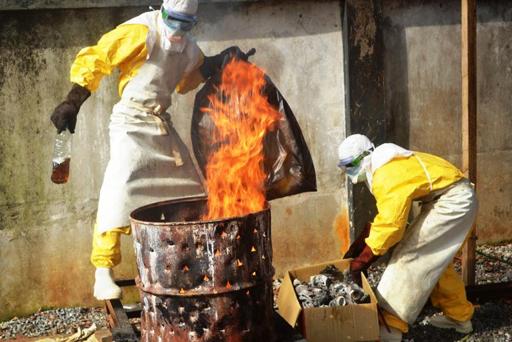LONDON - The Ebola crisis in West Africa that claimed its first victim exactly a year ago is likely to last until the end of 2015, according to a scientist who helped to discover the virus.
Two-year-old Emile Ouamouno died in the remote village of Meliandou in southern Guinea on Dec. 28 last year after suffering from a fever, headache and diarrhoea. His 3-year-old sister, mother and grandmother died days later.
These deaths went unnoticed and the disease smouldered undetected, according to the World Health Organisation (WHO). It was not until March that health officials in Guinea started to realise something worrisome was happening.
Ebola had never struck in West Africa and it took a while to recognise the start of what has become the world's worst outbreak of the virus that has killed more than 7,500 people and infected nearly 19,500 in Guinea, Sierra Leone and Liberia.
By August, the WHO declared the epidemic to be a "public health emergency of international concern".
Peter Piot, director of the London School of Hygiene and Tropical Medicine and part of a team to discover Ebola in 1976, said progress was being made in trying to stop the virus spreading but it would take time to develop vaccines.
"This will be an epidemic with a very long tail, and a bumpy tail ... we need to be ready for a long effort, a sustained effort [for] probably the rest of 2015," Piot told the BBC on Wednesday.
The hemorrhagic fever, which causes vomiting, diarrhoea and bleeding, is spread by contact with bodily fluids of the sick and it has no known cure.
Scientists studying Ebola since its discovery in Zaire - now Democratic Republic of Congo - in 1976 have long suspected fruit bats as being the natural hosts.
Piot, who has just returned from Sierra Leone, said the virus had peaked in Liberia where it has claimed about 3,376 lives, according to WHO figures.
He said it was likely to peak in Sierra Leone in the next few weeks where the virus has claimed 2,556 lives so far. Sierra Leone has almost half of confirmed cases.
Simple treatments such as intravenous fluids and antibiotics had driven mortality rates in Sierra Leone to as low as one in three compared to about 70 percent previously, he said.
"Treatment centres have now been established across the country with British help. You don't see any longer the scenes where people are dying in the streets," said Piot who has previously criticised the WHO's slow response to the outbreak.
He said developing a vaccine was essential "so that when there is another epidemic or maybe when this epidemic drags on for a long time, that we have that vaccine available".
This week the U.S. Department of Health and Human Services awarded contracts to NewLink Genetics Corp and GlaxoSmithKline Plc for faster development of vaccines.



















































